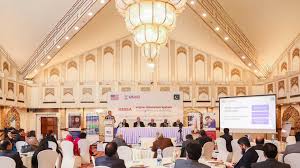
ISLAMABAD, Dec 14 (INP-WealthPK): The Higher Education System Strengthening Activity (HESSA) will help improve the higher education system in Pakistan that lags behind many countries due to a host of reasons, such as unavailability of funds, high fee structure, limited seats, poor infrastructure, reports WealthPK.
According to Dr Hassan Raza from the Quaid-i-Azam University, the HESSA will support higher education in Pakistan through institution strengthening, which will assist in improving skilled labour and economic development. It will provide need-based and merit-based scholarships.
Advanced study projects and other USAID education projects are included in this activity which will utilize evidence-based best practices from Asian and global higher education. As a result of this activity, many higher-education holders will be able to find work.
Dr Hassan said the HESSA will build stronger Pakistani universities offering education and research experiences the students need to be more employable on the local market.
The program will integrate the best practices in teaching, research, governance, and sustainability to benefit many public universities across the country. Through this program, the universities will provide the students with research opportunities, soft-skills training, and support services such as career counselling.
The USAID works with the Government of Pakistan and development partners to improve the quality of primary and higher education that will equip talented young people with the skills needed to find work and launch their careers.
The HESSA activity will also help the industry to increase production and employment. It will also respond to the needs of the business community and the sectors contributing to Pakistan’s economic growth.
“Pakistan has pledged to promote education and literacy through the educational policies at home and participation in international commitments pertaining to education. The national educational policies include strategies that are intended to increase literacy rates, build capacity, and improve educational facilities,” he added.
Pakistan is not the only country facing challenges regarding promotion of literacy and meeting education for all (EFA) and Millennium Development Goals (MDGs) commitments. South Asia pays the least attention to education.
Dr Hassan suggested that the local government system should help in promoting education and literacy in the country. In a local government system, funds for education would be allocated according to the community needs. Unemployment of educated men and women is a major concern for Pakistan. In schools, career counselling should be offered to students so that they can understand the job market and develop their skills accordingly.
He also suggested that technical education should be made a part of secondary education and classes for carpentry, electrical, and other technical education be included in the curriculum. Parent counselling is also essential to choose a market-friendly career for their child.

































































































